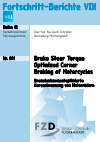Bremslenkmomentoptimierte Kurvenbremsung von Motorrädern
Brake Steer Torque Optimized Corner Braking of Motorcycles
Zusammenfassung
This thesis deals with the Brake Steer Torque (BST) induced stand-up tendency of Powered Two Wheelers (PTW) and measures to lower the associated risk for running wide on curve accidents with sudden, unforeseen braking. Focus is set on the BST Avoidance Mechanism (BSTAM), a chassis design that eliminates the BST through lateral inclination of the kinematic steering axis. A simple mathematical model is used to identify its main influences on the driving behavior and derive an optimized system layout. Its theoretical potential is evaluated against the standard chassis using different cornering adaptive brake force distributions and riding styles. For the first time ever, a motorcycle with state-of-the-art brake system (Honda CBR 600 RR, C-ABS) is equipped with a BSTAM and tested in corner braking experiments. Compared to the baseline, it is significantly reducing BST related disturbances and improving directional control. The gained insights can be stepping stones to enhance PTW safety by...
Schlagworte
Motorcycle Safety Corner Braking Chassis Design Brake System Assistance System Brake Steer Torque (BST) Brake Steer Torque Avoidance Mechanism (BSTAM) Bremslenkmoment (BLM) Bremslenkmomentverhinderer (BLMV)- 157–205 5 Driving Tests 157–205
- 206–220 6 Discussion and Outlook 206–220
- 221–255 A Appendix 221–255
- 256–262 Bibliography 256–262
- 263–264 Own Publications 263–264
- 265–268 Student Research Work 265–268

